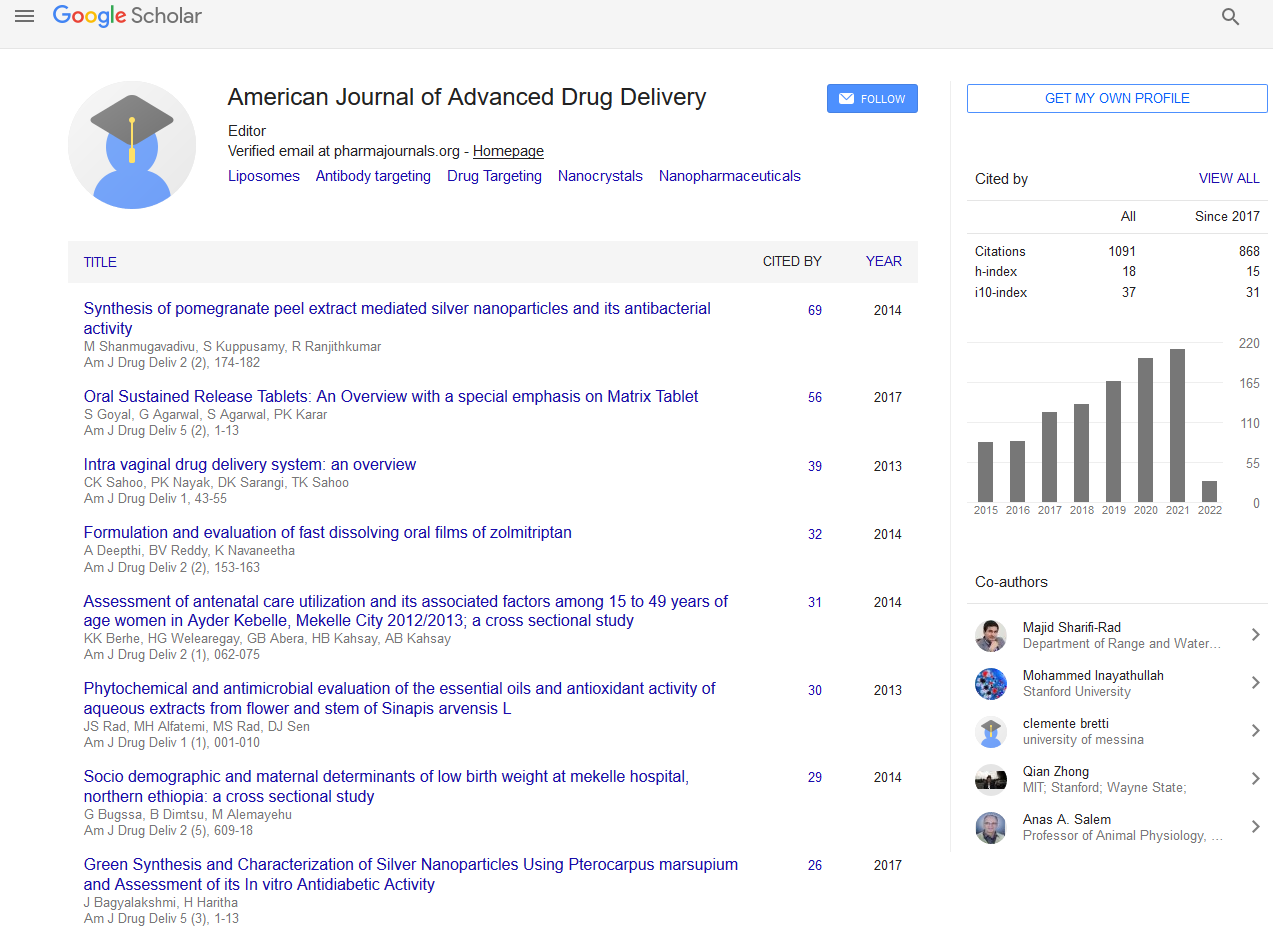Short Communication - (2024) Volume 12, Issue 1
Antibody Targeting: Precision Therapy Redefining Disease Treatment
Guijun Wang*
Department of Medical Sciences, California University, USA
*Correspondence:
Guijun Wang,
Department of Medical Sciences, California University,
USA,
Email:
Received: 28-Feb-2024, Manuscript No. IPAAD-24-19929;
Editor assigned: 01-Mar-2024, Pre QC No. IPAAD-24-19929;
Reviewed: 15-Mar-2024, QC No. IPAAD-24-19929;
Revised: 20-Mar-2024, Manuscript No. IPAAD-24-19929;
Published:
27-Mar-2024, DOI: 110.36648/2321-547X.12.1.01
Introduction
In the realm of modern medicine, precision therapy has emerged
as a transformative approach, aiming to tailor treatments to the
individual characteristics of each patient and disease. Antibody
targeting stands at the forefront of this revolution, offering
unparalleled precision in delivering therapeutic interventions to
specific cells, tissues, or molecules. This article delves into the
principles, applications, advancements, and future prospects
of antibody targeting, illuminating its pivotal role in the era of
precision medicine.
Description
Antibodies, also known as immunoglobulins are Y-shaped
proteins produced by the immune system in response to the
presence of foreign substances, called antigens. They are a
crucial component of the body’s defense mechanisms against
pathogens such as bacteria, viruses, and other microorganisms,
as well as abnormal cells such as cancer cells. Antibodies
recognize and bind to specific antigens with high affinity and
specificity, marking them for destruction by other immune
cells or neutralizing their harmful effects. Antibodies play a
central role in both the innate and adaptive immune responses,
contributing to immunity, immunological memory, and the
maintenance of health and homeostasis. Antibodies, also
known as immunoglobulins, are glycoproteins produced by
the immune system in response to foreign substances, known
as antigens. These antigens can be proteins, carbohydrates, or
other molecules that trigger an immune response. Each antibody
possesses a unique structure, with specific binding sites, called
epitopes, that recognize and bind to complementary antigens
with high affinity and specificity. Antibody targeting exploits
this inherent specificity to precisely deliver therapeutic agents
to disease targets while sparing healthy tissues. Antibody
targeting has revolutionized the treatment of various diseases,
spanning oncology, autoimmune disorders, infectious diseases,
and beyond. In oncology, monoclonal antibodies (mAbs) have
transformed cancer therapy by targeting tumor specific antigens,
such as cell surface receptors or tumor associated proteins.
These can be armed with cytotoxic payloads or engineered to
recruit immune effector cells, leading to targeted destruction
of cancer cells while minimizing collateral damage to normal
tissues. Another powerful application of antibody targeting is in
autoimmune disorders, where therapeutic antibodies are used
to modulate aberrant immune responses. For example, TNFalpha
inhibitors such as infliximab and adalimumab are widely
used to treat autoimmune conditions like rheumatoid arthritis
and Crohn’s disease by neutralizing the inflammatory actions of
TNF-alpha. Through techniques such as phage display, hybridoma
technology, and transgenic animal models, researchers can
generate antibodies with enhanced binding affinity, specificity, and
therapeutic properties [1-4]. Furthermore, antibody engineering
enables the optimization of antibody pharmacokinetics, tissue
penetration, and immunogenicity, paving the way for safer and
more effective therapies. Despite its promise, antibody targeting
faces several challenges, including antigen heterogeneity,
immunogenicity, and development of resistance. Moreover,
the high cost and complexity of antibody-based therapies pose
barriers to widespread adoption. To overcome these challenges,
ongoing research efforts are focused on developing novel
antibody formats, such as bispecific antibodies and antibodydrug
conjugates (ADCs), which offer enhanced targeting
capabilities and therapeutic payloads. Additionally, advances in
personalized medicine approaches, biomarker-driven therapy,
and combination regimens hold promise for optimizing treatment
outcomes and overcoming resistance mechanisms.
Conclusion
In conclusion, antibody targeting represents a paradigm shift
in therapeutic intervention, offering unprecedented precision
and efficacy in the treatment of diverse diseases. By harnessing
the exquisite specificity of antibodies, researchers can precisely
target disease targets while minimizing off-target effects and
maximizing therapeutic benefit. As we continue to advance our
understanding of disease biology and antibody engineering,
the future of antibody targeting holds immense promise for
transforming the landscape of healthcare and improving patient
outcomes worldwide. Through continued innovation and collaboration, antibody targeting will continue to play a central
role in the evolution of precision medicine, shaping the future of
disease treatment and patient care.
Acknowledgement
None.
Conflict Of Interest
The author’s declared that they have no conflict of interest.
References
- Kruk ME, Gage AD, Arsenault C, Jordan K, Leslie HH, et al. (2018) High-quality health systems in the sustainable development goals era: Time for a revolution. Lancet Glob Health 6(11): e1196-e1252.
[Crossref] [Google Scholar]
- Oyekale AS, Titilola HA, Abioye OP (2019) Adequacy of health care delivery facilities in rural South Western Nigeria: Evidence from a health facility census. J Pub Health Afr 10(2): 866.
[Crossref] [Google Scholar]
- Olmen VJ, Marchal B, Damme W, Kegels G, Hill PS, et al. (2017) The health system dynamics framework: The introduction of an analytical model for health system analysis and its application to two case-studies. Health Cultur Soc 9(1): 1-21.
[Crossref] [Google Scholar]
- Perry HB, Zulliger R, Rogers MM (2014) Community health workers in low middle, and high-income countries: An overview of their history, recent evolution, and current effectiveness. Annu Rev Public Health 35: 399-421.
[Crossref] [Google Scholar]
Citation: Wang G (2024) Antibody Targeting: Precision Therapy Redefining Disease Treatment. Am J Adv Drug Deliv. 12:01.
Copyright: © 2024 Wang G. This is an open-access article distributed under the terms of the Creative Commons Attribution Li�cense, which permits unrestricted use, distribution, and reproduction in any medium, provided the original author and source
are credited.

